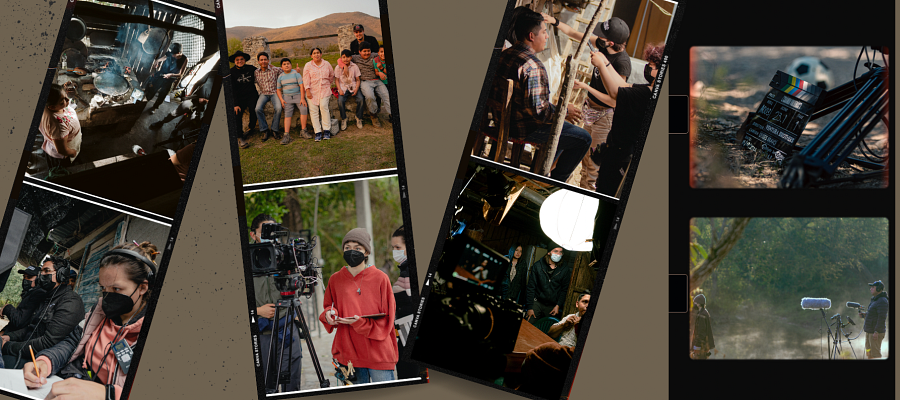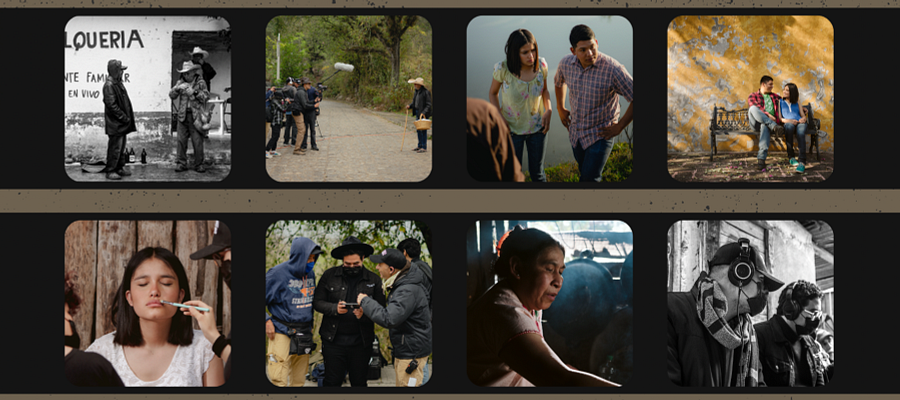Celes Ventura and Erick Ventura Jr., also known as the Ventura Brothers, are the Directors, Screenwriters, and Associate Producers of ¿Cuándo Volverás? – a film that highlights the migrant culture in Mexico.
According to the film’s synopsis, "¿Cuando Volveras? tells the story of a grandmother (Doña Conchita) who is taking care of her grandson (Tomás) after her son (José) went to the United States in search of the American dream. However, José is part of the group of migrants who disappeared and were never heard from again. That is why Doña Conchita tries to hide the truth from Tomás, who still has hope of being able to see his father again. It is a story full of memories and emotions, which takes us to one of the most remote and beautiful unknown places of Mexico.”
Ever since the Ventura Brothers were children, they say they have always wanted to tell stories, as they grew up in an environment of audiovisual production since their parents are journalists. “We think we always saw making movies as a dream. However, as time went by, that passion became our job. Since then, we have been creating content,” they add.
After arriving in Canada to learn English, they lived for six months in Toronto studying the language. They liked the idea of studying at a college in the city, which is partly what led them to Centennial’s Communications and Media Fundamentals (CAMF) program, which they graduated from in 2019.
“We looked at several options, and we loved Centennial. That is why we applied and studied in this program which allowed us to improve and develop our skills, both in writing and in audiovisual production. The program helped us to meet the Centennial community that makes short films and different kinds of audiovisual projects,” they explain.
Reflecting on the lessons from the program, they mention that meeting and working with those in the program was what helped them the most. “We created a friendship and a work team.” They add, “The CAMF program helped us to develop our writing with classes like Writing for Media with Maestra Errol Nazareth, where we learned better grammar and structure of our ideas.”
They continue, “We have a similar experience in the class with Professor Mike Countryman. He helped us in our creative process, where we understood how to create a better narrative for our stories. As a foreigner, it is hard to make stories narrated in English due to the differences in the languages. That's why we feel this class was helpful since we learned how to narrate in another language and with new structures.”
Both Celes and Erick say they firmly believe that this program gave them the confidence to make content, and they could put the lessons they learned in the program into practice.

Q. WHAT WAS INVOLVED WHEN MAKING THIS FILM? AND WHY DID YOU WANT TO FOCUS ON THIS TOPIC?
This process started right after we graduated. We had what people call homesickness. This became more noticeable during the quarantine at the beginning of the pandemic. We decided to write a script about where we are from, the Sierra Gorda of Querétaro, in central Mexico.
As context, we were shocked by a case in our community twelve years ago. Two groups of migrants on their way to the United States disappeared, including a person who works in our family business, who decided to go to the United States this way and disappeared.
We create a story that tells us about the fact but also shows the culture of our country. We demonstrate the typical music of the place, the regional food as well as the people of the community.
Being able to record the film was a process that took us two years since we had to organize everything in the best possible way. For two years, we worked on the pre-production and development of the project. At first, it was just the two of us, Erick and Celes, the Ventura Brothers, but as the project progressed, more people got involved. The challenge was, in part, the budget, which was fully paid for by us. In addition to having to do all the bureaucratic procedures, such as permits to record in various locations.
We recorded the film in a village called Tilaco, where at first, the community did not get very involved, but as this process progressed, everyone participated. We have an experienced crew who have participated in both national and international films. With them, we managed to shape the project that gradually evolved.
When we had almost everything ready to record, it was time to hire the talent, both actors and actresses. Our main actress is Clementina Guadarrama, who has worked in films with several directors, such as Alfonso Cuaron and Alejandro G. Iñárritu, as well as in the Netflix series. For us, it was an honour to have her talent. We have other talented people such as Alejandra Camacho and Giselle Barrera, actresses in Prayers for the Stolen by director Tatiana Huezo, which was a finalist to be nominated for the Oscars for best international film. We also had local actors and actresses who participated in the film.
With this well established, we arrived at the project development process, where we had rehearsals, technical scoutings and fine-tuned details for production.
Q. HOW WAS YOUR OVERALL EXPERIENCE MAKING THIS FILM?
It was a complex process due to the history, but thanks to the support of the entire crew, we were able to have an effective production. We considered that the best thing was to have good pre-production because we only got to record and continue with the scenes.
One of our most beautiful experiences is that the community came together and was with us at all times. The people of this little town were extras, production assistants, and art assistants, among many other things. For us, the union with the community was important because that motivated us to give the best of ourselves.
Recording in Mexico is a different experience than in Canada because the processes are different. In Mexico, you have to have a better structure of production days since you cannot waste time due to limited resources. You must also be careful with security, although where we record is not a dangerous area. Still, it's always good to have security. But in the same way, many protocols can be done in the "Mexican way."
We would also like to mention how complicated it was to record the movie with COVID-19 protocols. In Mexico, the Mexican industry asked us to do PCR tests on everyone involved in the film. We had to have good organization and care during production because if someone was infected, we would have to stop production indefinitely. Fortunately, no one was infected during production.
The production was difficult, but the entire work team completed the film, and we will all be satisfied with the work done.

Q. WHAT WERE YOUR FAVOURITE PARTS ABOUT WRITING AND DIRECTING/PRODUCING THE FILM?
What we liked the most was that it all started with a nostalgic idea. We have always loved our country, and telling these stories seems like an opportunity for everyone to get to know our culture from a different perspective. The process will always be complicated, but every project entails many sacrifices.
We also see this as an opportunity for this case to be resolved. We have had talks with the relatives of the disappeared, and they still have hope of knowing the truth.
That is why we believe that this story can help raise awareness about migration. We were migrants for a time in Canada, and we have always felt that we are responsible for speaking up about this fact.
Q. WILL THIS FILM SCREEN IN FESTIVALS?
We are currently in the process of distribution and exhibition in which we will work so that the film is seen both in theatres and on digital platforms. We will do the festival tour in 2023, which we have yet to decide.
We want this film not to stay only in Mexico but for everyone to see it. This is because it was made for an international audience to learn a little more about migration.
LEARN MORE ABOUT THE VENTURA BROTHERS AND THE FILM
Celes and Erick want to add, “We thank Centennial College for all its attention while we were students and now that we are graduates. We want to tell all those national and international students that, just like us, fight for everything you have always wanted to be. Do not leave your dreams behind because you will always achieve your goal, even if it is a long road.”
You can follow The Ventura Brothers on Instagram @theventurabrothers and find out more about the film here.
Article by: Alexandra Few
Check out and subscribe to our Storyteller newsletter to read all the other great stories happening in and around the Story Arts Centre.
